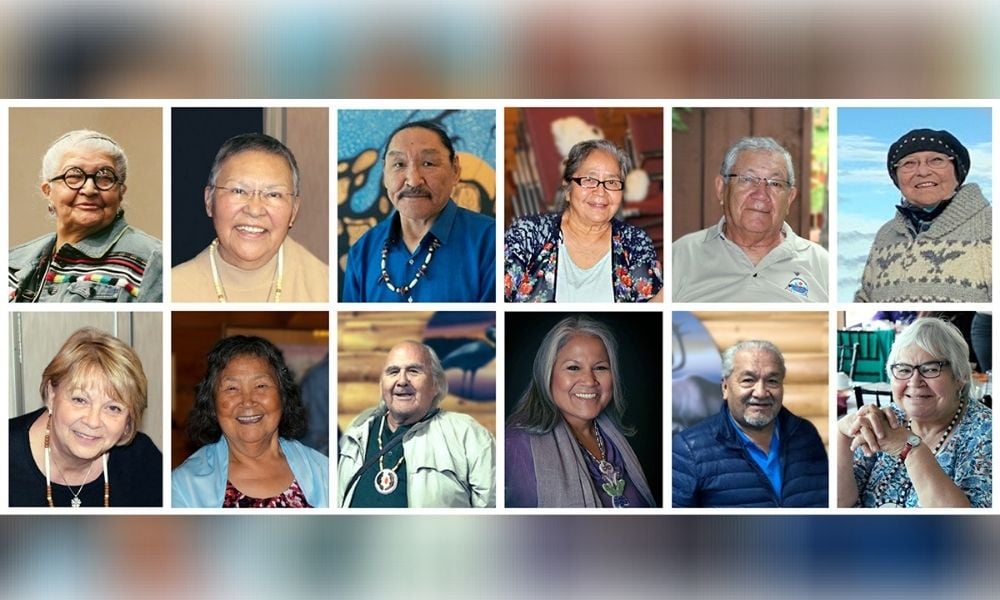
Council awarded for work assisting Indigenous Justice Division of Ministry of the Attorney General

The Elders’ Council is the recipient of the Law Foundation of Ontario's 2020 Guthrie Award for its work in assisting the Indigenous Justice Division of the Ministry of the Attorney General.
Comprised of 13 Indigenous Elders from across Ontario, the Elders’ Council is working to support the reclamation of Indigenous legal systems and help repair the relationship between the province’s Indigenous communities and the Ministry of the Attorney General.
The Elders’ Council has helped develop and facilitate Bimickaway, the Indigenous cultural competency training for justice sector workers.
Elder Janice Longboat told Law Times she had been working with Indigenous people in the Brantford Ont. courthouse and was struck by the deficit in understanding of Indigenous systems of law and history. She says that in bridging the gap between Indigenous and Canadian perspectives, Bimickaway has been “a real giant step forward in resolving a lot of different issues.”
“I think it's really served its purpose very, very well,” says Longboat, who is Mohawk, from the Turtle Clan of Six Nations of the Grand River.
“I've been to enough of those training sessions to see the impact,” says Elder Dr. Marlene Pierre. “…You can see the difference. People want to work together. And I attribute that to the [Truth and Reconciliation Commission] recommendations and in the work of Murray Sinclair. And in my view, he has caused the real turn in the arc in terms of understanding justice.”
In the Anishinaabemowin language, Bimickaway means “to leave footprints.” More than 5,900 people have completed the training since 2016.
Pierre is from Thunder Bay, Ont. and is a member of Fort William First Nation. She says the Council, which includes members from Inuit and Metis communities, allows for the collaboration of diverse thought and counsel.
The 13 Elders from across Ontario each bring unique understandings of their own ways of justice, says Longboat. For example, Pierre adds that her experience working with Inuit elders has allowed her to learn about a worldview, spirituality and everyday way-of-life, of which she was previously unfamiliar.
“That's really important for us to create a strong bond with all the Aboriginal people in Canada,” she says.
But the present justice system’s many remaining challenges call for transformational change, says Pierre.
“One big item that [Longboat] and I have tried to address is starting a discussion, starting a process, doing whatever it takes to set up and begin to develop our own justice system that would operate parallel to your system,” she says.
The Council is gender-balanced, Elders are recruited based on their leadership strengths and “specialized knowledge” and the Council is “reflective of the diverse Indigenous Nations and regions of the province,” said the Law Foundation’s announcement. The Council has advised three Attorneys General and staff from various ministries and divisions in the government.
“The Elders bring a compelling truth and integrity to their work,” said Linda Rothstein, board chair of the Law Foundation, in its announcement. “By sharing their knowledge and lived experiences directly with those within the justice sector, the Elders’ Council is helping to transform not just opinions but policies and laws that could bring about meaningful change and improve access to justice for Indigenous people across the province.”
The Council has also delivered presentations at Sharing Our Justice Bundles Gathering, ReconciliACTION Forum and the Ontario Human Rights Commission’s Indigenous Peoples and Human Rights Dialogue forums. The Council has consulted with the Independent Review of Ontario Corrections, the National Inquiry into Missing and Murdered Indigenous Women and Girls Expert Hearings and advised on Indigenous Design elements for the New Toronto Courthouse. The Council also provides one-on-one support to families during the coroner’s inquests related to missing and murdered Indigenous women and girls and helps facilitate family circles with the Indigenous Justice Divisions’ Family Information Liaison Unit services.
The Guthrie Award was created in 1996 to honour Donald Guthrie, long-time Law Foundation member and chair of the board.
Photographed above: the Elders’ Council currently consists of Janice Longboat, Helen Cromarty, Sytukie Joamie, Pauline Shirt, Barney Batise, Dr. Marlene Pierre, Verna Porter-Burnelle, Sally Webster, Katsi Cook, Gilbert Smith, Donna Debassige